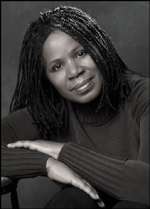University
Communications
Office
Arkansas State University
Jonesboro,
Arkansas
Staff:
Tom Moore
Sara McNeil
(870) 972-3056
fax (870) 972-3069
More information:
NewsPage
Links to News Releases
& Announcements
Campus Calendar
Public activities at ASU
Campus News
Faculty and Staff
achievements
About
ASU
Overview, history
and more |
Janis Kearney, presidential diarist,
to speak as part of Lecture-Concert Series
Sept. 27, 2007 --
Arkansas State
University in Jonesboro presents author and presidential diarist Janis
Kearney on Thursday, Oct. 4, at 7 p.m. in the Reng Student Services
Center/Student Union Auditorium in the second event of the 2007-2008
Lecture-Concert Series. Kearney will present a lecture, “A Paper
Trail…Creating a Presidential Legacy.”
Kearney, the author of two books, is spending the 2007-2008 academic
year on the ASU campus. This fall, she is teaching two special-topics
courses in the College of Humanities and Social Sciences, and she will
teach two other special-topics courses during the spring semester, as
well. Her courses this fall are “Inside the Clinton Presidency,” in
Political Science, and “Memoir Writing: Using memory and stories to
write our world,” in English. Kearney has also served as the
Chancellor’s Lecturer at the City Colleges of Chicago.
 Janis Kearney is one of 19 siblings who grew up in Gould,
Arkansas, a small town in southeast Arkansas. Her parents, James and
Ethel V. Kearney, were sharecroppers. Kearney graduated from Gould High
School in 1971, and enrolled at the University of Arkansas, where she
earned a BA in journalism. She continued her education at UALR, earning
30 hours toward an MPA. Kearney worked for the State of Arkansas for
three years as a program manager for the Comprehensive Employment and
Training Act, and another six years as director of information for the
national headquarters of the Migrant Student Records Transfer system. Janis Kearney is one of 19 siblings who grew up in Gould,
Arkansas, a small town in southeast Arkansas. Her parents, James and
Ethel V. Kearney, were sharecroppers. Kearney graduated from Gould High
School in 1971, and enrolled at the University of Arkansas, where she
earned a BA in journalism. She continued her education at UALR, earning
30 hours toward an MPA. Kearney worked for the State of Arkansas for
three years as a program manager for the Comprehensive Employment and
Training Act, and another six years as director of information for the
national headquarters of the Migrant Student Records Transfer system.
In 1987, Kearney purchased the Arkansas State Press newspaper from civil
rights legend Daisy Bates, and published the weekly newspaper until
1992, when she took a sabbatical to work in the Clinton/Gore
presidential campaign as director of minority media outreach. She fully
expected to return to the Arkansas State Press, but when Clinton’s White
House Press Secretary Dee Dee Myers asked her to join the White House
Press Office in 1993, Kearney did.
After a stint in White House Media Affairs, she was appointed director
of public affairs and communications for the U.S. Small Business
Administration. Kearney’s husband, Bob Nash, also served in the Clinton
White House as director of presidential personnel, recruiting and
vetting the hiring of presidential appointees. In 1995, Kearney became
the first presidential diarist in U.S. history, chronicling the
day-to-day life of President Clinton.
After leaving the White House in 2001, Kearney and Nash moved to
Chicago, where he was appointed vice chair for ShoreBank Corporation.
Kearney was named a fellow at Harvard University’s W.E. B. DuBois
Institute for 2001-2003, where she began researching and writing an
oral biography of Clinton’s legacy, particularly on matters of race,
“Conversations: William Jefferson Clinton, From Hope to Harlem.”
For “Conversations,” Kearney interviewed more than 100 African-Americans
from all walks of life, including Clinton’s babysitter from Hope,
Arkansas. Her interviewees discussed Clinton’s legacy in terms of race,
his leadership, and his presidency.
In November of 2004, Kearney and Nash founded Writing our World Press, a
small publishing house. Their first book is her memoir, “Cotton Field of
Dreams,” which debuted at the opening of the Clinton Presidential
Library in Little Rock. Two other titles have followed, “Conversations:
William Jefferson Clinton, From Hope to Harlem,” and “Quiet Guys do
Great Things, Too,” by Frank Ross, as told to Janis Kearney.
For more details, please contact Dr. Gil Fowler, associate dean for the
Honors College, at (870) 972-2308 or via e-mail at
gfowler@astate.edu, or visit
http://honors.astate.edu.
The Lecture-Concert Series presents diverse programs to enrich the
cultural life of the campus, community, and region.
# # #
|
